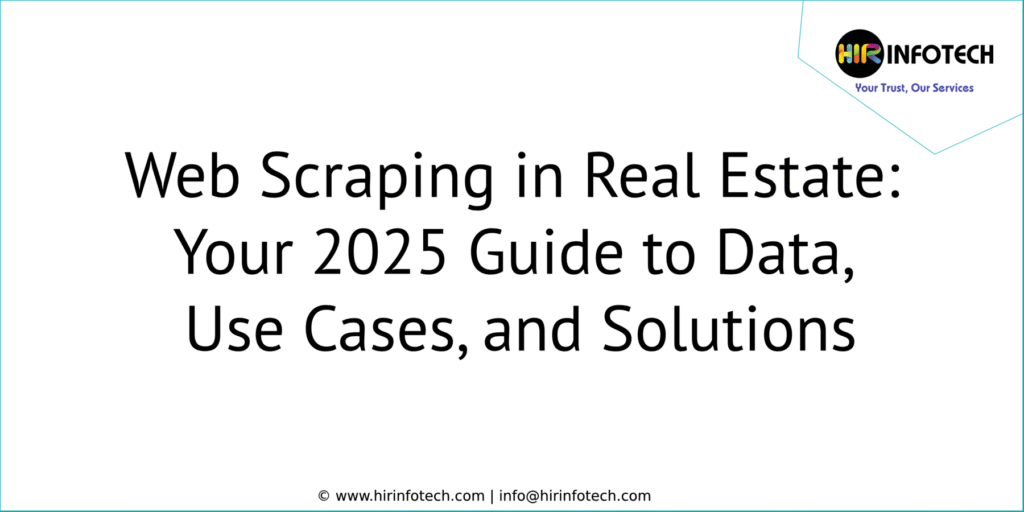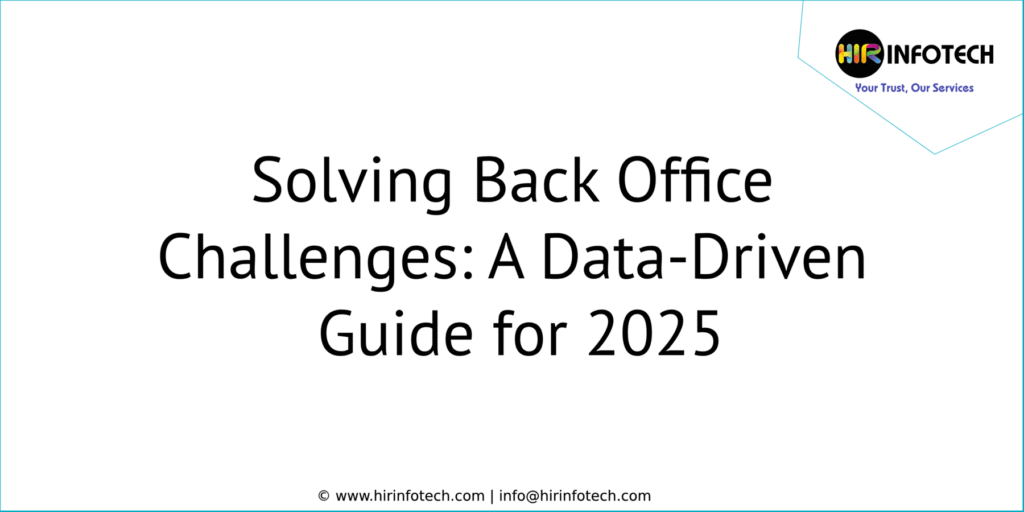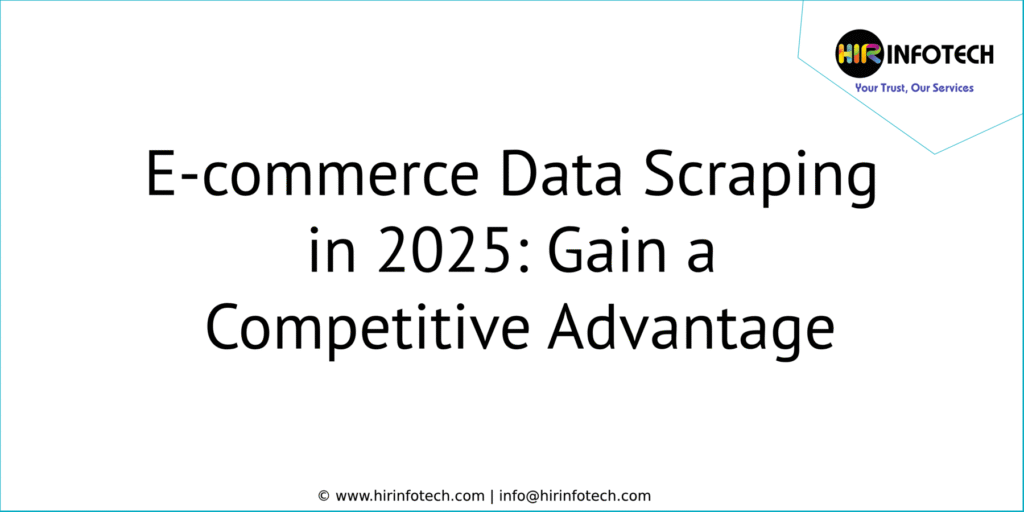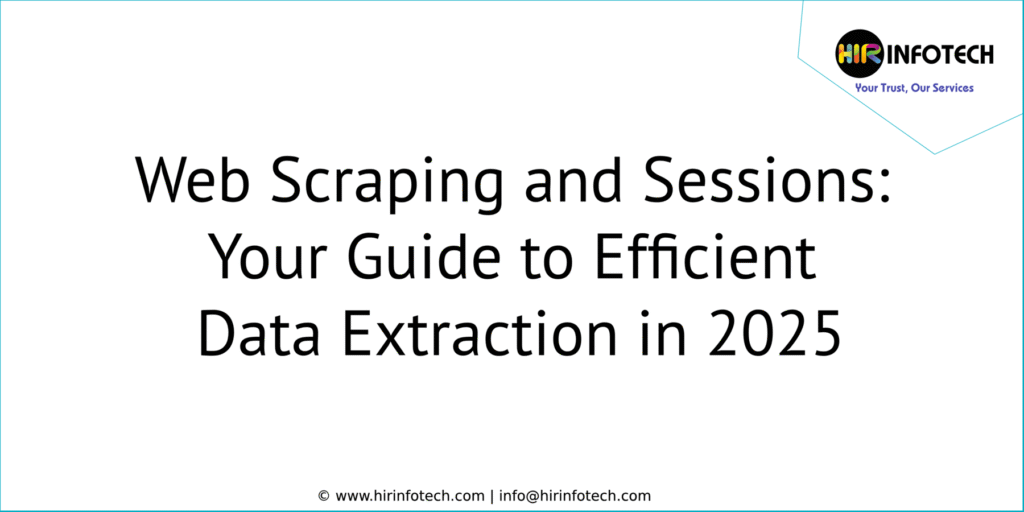
Introduction
The real estate world moves fast. New listings, price changes, and market shifts happen constantly. Staying informed is key for real estate agents, investors, and anyone seeking a competitive edge. Manual data collection is impossible. That’s where web scraping comes in. This post will explain web scraping for real estate in 2025. It’s your complete guide.
What is Web Scraping in Real Estate? (And Why It Matters in 2025)
Web scraping is like having a super-efficient research assistant. It automatically gathers data from real estate websites. Imagine collecting thousands of property listings, prices, and market details in minutes. That’s the power of web scraping. It’s not about copying and pasting; it’s about automated, large-scale data extraction.
In 2025, data is more critical than ever. The National Association of REALTORS® reports that over 95% of homebuyers use online tools in their search. This number is growing. To succeed, you need real-time insights, and web scraping provides them.
Here’s what web scraping can collect:
- Property Details: Location, size, bedrooms, bathrooms, features – everything from the listing.
- Pricing Data: Current prices, rental rates, historical trends. Find profitable opportunities.
- Customer Reviews: Understand buyer preferences. Learn what amenities are in demand.
- Competitor Insights: See your competitors’ listings and pricing. Stay ahead of the game.
- Public Records: Access government data, mortgage information, and local income stats. Get the full picture.
Key Benefits of Web Scraping for Real Estate Professionals
- Save Time and Resources: Automate data collection. Focus on analysis and strategy, not manual work.
- Gain a Competitive Advantage: Make data-driven decisions. Identify trends before your competitors.
- Improve Accuracy: Eliminate human error. Get reliable, up-to-date information.
- Enhance Market Research: Understand market dynamics. Spot opportunities and potential risks.
- Boost Lead Generation: Identify potential buyers and sellers. Target your marketing efforts.
- Scale Your Business: It is the best solution to deal with your large-scale data requirements.
Use Cases of Real Estate Data Scraping: Real-World Applications (Updated for 2025)
Web scraping isn’t just a technical concept. It has practical applications across the real estate industry. Here’s how different players can use it:
1. Real Estate Agent Data Collection & Networking
- Build Your Network: Scrape agent contact information. Connect with other professionals.
- Understand Agent Expertise: Analyze current and past listings. Identify agents specializing in your niche.
- Streamline Outreach: Gather data for targeted marketing campaigns.
2. Comprehensive Property Market Research (2025 Trends)
- Identify Hot Properties: Find high-demand areas and property types. Stay ahead of the curve.
- Track New Developments: Monitor project statuses. Anticipate market changes.
- Analyze Market Trends: Understand mortgage and insurance rate expectations. Make informed decisions.
- Stay abreast of the newest developments: Be aware of all the recent real estate market dynamics and stay ahead.
3. Dynamic Price Optimization
- Competitive Pricing: Analyze competitor prices for similar properties. Adjust your strategy.
- Maximize Profits: Set prices based on real-time market data. Attract buyers without undervaluing your listings.
- Identify Undervalued Properties: Find investment opportunities with high potential returns.
4. Understanding Home Buyer Sentiment (Beyond the Basics)
- Go Beyond Reviews: Scrape not just ratings, but also the text of reviews. Use natural language processing (NLP) to understand sentiment.
- Identify Key Features: Learn what buyers truly value – layout, parking, smart home features, etc.
- Understand Relocation Motivations: Discover why people are moving. Tailor your services to their needs.
- Analyze Neighborhood Preferences: Scrape data on schools, parks, and local amenities. Highlight these in your listings.
5. Hyper-Targeted Advertising
- Regional Data Collection: Gather pricing and demographic data for specific areas.
- Personalized Campaigns: Create ads that resonate with local buyers. Increase engagement and conversion rates.
- Precise Targeting: Reach the right audience with the right message at the right time.
6. Accurate Market Forecasting (Predictive Analytics in 2025)
- Real-Time and Historical Data: Access a wealth of information for analysis.
- Predict Future Trends: Anticipate market cycles and pricing changes. Make proactive decisions.
- Estimate ROI: Calculate potential returns on investment. Minimize risk and maximize profit.
- Predict Sales: Forecast sales with latest predictive models and get future insights.
7. AI Training and Augmented Reality (AR) Applications
- Visual Data Collection: Scrape images of property interiors. Train AI models for AR applications.
- Virtual Staging: Enhance property tours. Help buyers visualize their future home.
- Personalized Design Suggestions: Develop apps that offer customized design ideas based on real interior data.
- Improve User Experience: Make property searching more interactive and engaging.
- Advance Property Viewings: Allow buyers to experience properties in an exceedingly new light.
8. Lead Generation and Prospecting
- Identify Potential Sellers: Scrape data indicating life events (e.g., job changes, growing families) that often precede a home sale.
- Find Motivated Buyers: Analyze online activity to identify individuals actively searching for properties.
- Qualify Leads: Gather data on financial pre-approval and other indicators of buyer readiness.
9. Risk Assessment and Due Diligence
- Property History: Access past sales data, ownership records, and any reported issues (e.g., liens, foreclosures).
- Neighborhood Safety: Scrape crime statistics and other relevant data to assess neighborhood risk.
- Environmental Factors: Gather information on potential hazards (e.g., flood zones, proximity to industrial sites).
10. Commercial Real Estate Analysis
- Lease Data: Scrape information on lease terms, occupancy rates, and tenant profiles.
- Market Comparisons: Analyze comparable properties to determine fair market value and lease rates.
- Investment Opportunities: Identify promising commercial properties based on location, market trends, and potential ROI.
Data Sources for Real Estate Web Scraping: Your Treasure Trove of Information
Knowing where to find the data is as important as knowing how to collect it. Here are some key categories and sources, updated for 2025:
| Data Category | Description | Sources |
| Property Listings Data | Details on properties for sale or rent (address, size, amenities, price, contact info). | Zillow, Realtor.com, Apartments.com, Trulia, MLS (Multiple Listing Service), PropertyShark, Redfin, LoopNet (for commercial properties) |
| Transaction Data | Information on completed sales (prices, dates, property details). | Public property records, County assessor’s offices, RealtyTrac, HMDA Data (Home Mortgage Disclosure Act), ATTOM Data Solutions |
| Market Trends and Analytics | Data on market trends, home price indices, and supply-demand dynamics. | Zillow Research, Redfin Data Center, Realtor.com Market Data, National Association of Realtors (NAR), CoreLogic MarketTrends, S&P CoreLogic Case-Shiller Indices, Trading Economics |
| Mortgage Data | Data on mortgage rates, loan originations, delinquencies, and affordability. | Freddie Mac House Price Index, Federal Housing Finance Agency (FHFA), FRED API (Federal Reserve Economic Data), HMDA Data, Mortgage Bankers Association (MBA) |
| Property Valuation Data | Property value estimates and appraisal reports. | Zillow API, Redfin API, CoreLogic, ATTOM Data Solutions, Estated, Automated Valuation Models (AVMs) from various providers |
| Foreclosure Data | Information on properties in foreclosure (auction dates, REO properties). | RealtyTrac, Auction.com, Public records, Foreclosure listing websites, ATTOM Data Solutions |
| Geospatial and Neighborhood Data | Data on neighborhood characteristics (schools, crime rates, amenities). | City-data.com, Walk Score API, GeoData Plus, PolicyMap, NeighborhoodX, GreatSchools, Niche.com |
| Demographic Data | Population, household demographics, income levels. | U.S. Census Bureau, Data.gov, National Association of Realtors (NAR), PolicyMap, ATTOM Data Solutions, Esri Tapestry Segmentation |
| Construction and Development Data | Data on building permits, new housing starts, and development projects. | U.S. Census Bureau’s Building Permits Survey, Open Data Portals (various cities), Local building departments, Dodge Data & Analytics |
| Real Estate Investment Data | Data on investment trends, ROI, cap rates, rental market analysis. | National Council of Real Estate Investment Fiduciaries (NCREIF), ATTOM Data Solutions, CoreLogic, HouseCanary, Real Capital Analytics |
| Consumer Sentiment Data | Data from reviews, ratings, and social media about properties and neighborhoods. | Yelp, Google Reviews, Facebook, Twitter, Reddit, BiggerPockets, City-Data Forum |
Methods for Scraping Real Estate Data: Choosing the Right Approach
There are several ways to approach web scraping. The best method depends on your technical skills, budget, and data needs.
- Building Your Own Scrapers (DIY – For the Technically Inclined):
- Pros: Full control, highly customizable, potentially cost-effective in the long run.
- Cons: Requires programming knowledge (Python is popular), time-consuming to build and maintain, need to handle website changes.
- Best For: Companies with in-house development teams, complex and unique data needs.
- Tools: Python (with libraries like Beautiful Soup, Scrapy, and Selenium), Requests library.
- No-Code Scraping Tools (Point-and-Click Simplicity):
- Pros: Easy to use, no coding required, fast setup, ideal for non-technical users.
- Cons: Less flexible than custom scrapers, may not handle all websites, potential limitations on data volume.
- Best For: Real estate agents, small businesses, individuals who need data quickly and easily.
- Examples: Octoparse, ParseHub, Dexi.io (formerly CloudScrape).
- Scraping APIs (Structured Data Access):
- Pros: Reliable, fast, structured data output (usually JSON or XML), designed for developers.
- Cons: May require a paid subscription, limited to the data provided by the API.
- Best For: Businesses needing large-scale, consistent data access, developers integrating data into applications.
- Examples: Zillow API, Redfin API, Realtor.com API (check availability and terms).
- Outsourcing Web Scraping (Delegating the Task):
- Pros: Frees up your time, access to expertise, handles complex scraping projects, scalable.
- Cons: Higher cost, potential communication challenges, reliance on a third-party provider.
- Best For: Companies with large or complex data needs, those lacking in-house expertise, projects requiring custom solutions.
- Example: Hir Infotech (and other web scraping service providers).
Best Practices for Ethical and Legal Web Scraping
Web scraping is powerful, but it’s crucial to do it responsibly. Here are key guidelines:
- Check Website Terms of Service: Always review the website’s terms of service. Some sites prohibit scraping. Respect their rules.
- Don’t Overload Servers: Send requests at a reasonable rate. Avoid overwhelming the website. Use delays between requests.
- Respect Robots.txt: This file tells scrapers which parts of the site are off-limits. Follow its instructions. You can check this by typing website url/robots.txt.
- Identify Yourself: Use a clear user-agent string. Let the website know who you are.
- Use Proxies: Rotate IP addresses. This helps avoid getting blocked.
- Handle Data Responsibly: Protect any personal data you collect. Comply with privacy regulations (like GDPR and CCPA).
- Be Mindful of Copyright: Don’t scrape copyrighted content without permission.
- Avoid Scraping Personal Data Unless Necessary: Only collect the data you absolutely need.
- Stay Updated: Websites change. Your scraper may need adjustments.
The Future of Web Scraping in Real Estate
Web scraping is constantly evolving. Here are some trends to watch:
- Increased Use of AI and Machine Learning: AI will help automate data cleaning, analysis, and even scraper maintenance.
- More Sophisticated Anti-Scraping Measures: Websites will continue to develop techniques to block scrapers. Adaptability is key.
- Greater Focus on Data Quality: Businesses will demand higher accuracy and reliability in scraped data.
- Rise of Real-Time Data Streams: The need for up-to-the-minute information will drive the development of real-time scraping solutions.
- Integration with Other Technologies: Data analysis and visualization technologies with the use of scrapers.
Frequently Asked Questions (FAQs)
- Is web scraping legal?
Web scraping is generally legal if you follow the rules. Respect website terms of service, robots.txt, and avoid collecting personal data without consent. It’s a gray area, so be cautious and ethical. - How much does web scraping cost?
The cost varies widely. DIY scraping can be free (excluding your time). No-code tools have monthly subscriptions. Outsourcing is the most expensive but offers the most comprehensive service. - Can I scrape Zillow without getting blocked?
Zillow is known to be challenging to scrape. Use proxies, rotate user agents, and respect their robots.txt. Consider their API if available. Slow, steady scraping is less likely to trigger blocks. - What data format does web scraping provide?
Most scrapers can output data in various formats: CSV, Excel, JSON, XML. Choose the format that best suits your needs. - How often should I scrape data?
It depends on your needs and the website. For rapidly changing data (like prices), you might scrape daily or even hourly. For less dynamic data, weekly or monthly scraping may be sufficient. - How to maintain a web scraper? Websites often undergo modifications. Therefore, it’s essential to consistently evaluate and revise your scraper’s code to accommodate these updates.
- How can web scraping improve my real estate investment decisions?
Web scraping can provide you with valuable data on market trends, property values, rental yields, and competitor activity. This data can help you identify profitable investment opportunities, assess risks, and make more informed decisions.
Ready to unlock the power of real estate data? Hir Infotech provides expert web scraping, data solutions, and data analytics services. We can build custom scrapers, provide API integrations, or manage your entire data collection process. Contact us today to discuss your needs and get a free consultation. Let us help you gain a competitive edge in the ever-evolving real estate market.



